NI council Irish language sign process too difficult, report says
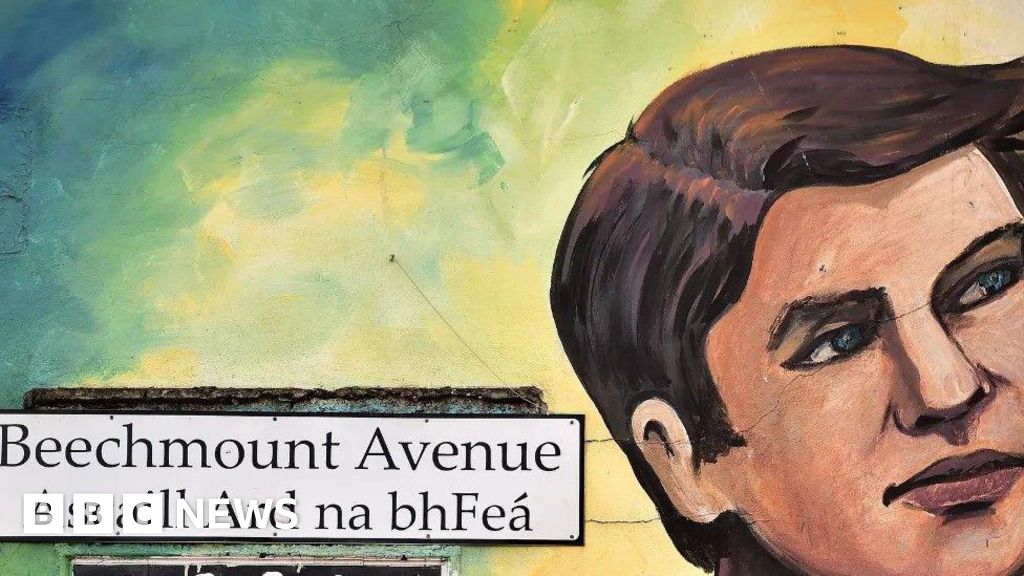
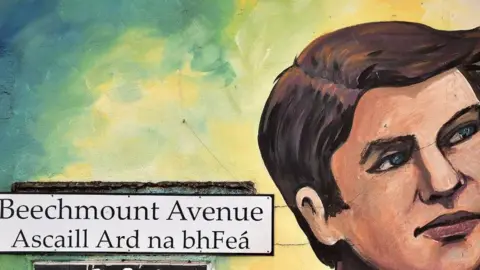 Getty Images
Getty ImagesMany councils in Northern Ireland make it too difficult for Irish language street signs to be approved and put up, a body of European experts has said.
But language experts from the Council of Europe (CoE) also said street signs remained “a highly contentious topic”.
According to a new report, Ulster-Scots speakers are also “in a very weak position” in Northern Ireland.
“There is almost no presence of Ulster-Scots in public life,” they added.
New language laws came into effect with the passing of the Identity and Language (Northern Ireland) Act 2022.
But many of the practical measures enabled by those laws have not been enacted.
For instance, commissioners for Irish and what is described as the “Ulster Scots/Ulster British tradition” have not been appointed and an Office of Identity and Cultural Expression has not yet been established.
The committee of language experts is appointed by the Council of Europe to monitor the United Kingdom’s compliance with the European Charter for Regional or Minority Languages.
‘Inconsistent approach’ to signage
The committee said despite new legislation language issues remained “politicised” in Northern Ireland with more efforts needed to promote Irish and Ulster-Scots.
The report said there was “an inconsistent approach to bilingual signage requests.”
Irish language campaigners recently staged a protest at Belfast’s new Grand Central Station after the transport hub was opened without Irish language signage.
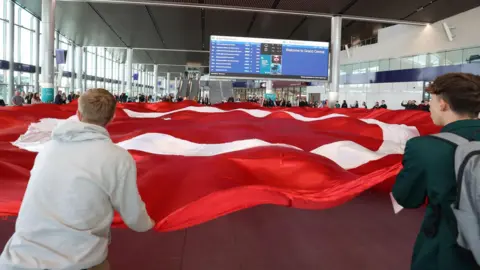 Pacemaker
PacemakerThe experts commented that the criteria for approval of bilingual signage, which they said was a “highly contentious topic”, is left to local authorities.
“The existence of high thresholds limiting the possibility to put up bilingual signs” were incompatible with the UK’s compliance with the European Charter for Regional or Minority Languages.
Their report said only five out of Northern Ireland’s 11 councils had policies providing guidance on the use of Irish in different sectors of public life – like signs – or accepted written and oral communications in Irish and published documents in Irish.
‘Timely report’
Pádraig Ó Tiarnaigh, from Irish language group Conradh na Gaeilge, said the report mirrored previous criticisms made around a “consistent lack of progress” on key policy development such as the introduction of an Irish language strategy.
“When you have issues agreed in legislation…the bare minimum in terms of legitimate expectations will be that those commitments will be fulfilled,” he said.
“That hasn’t happened here.”
Dr Ó Tiarnaigh said in relation to dual signage, in areas like Belfast – where a proposed sign needs the support of 15% of residents – councils could be more “positive ambassadors for minority languages”.
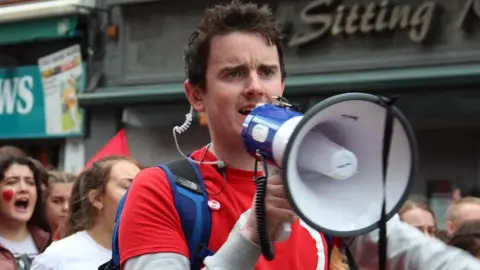 Conradh na Gaeilge
Conradh na GaeilgeUlster-Scots speakers ‘in very weak position’
A strategy is a long-term plan to protect and promote the language but is separate to language laws.
When it came to Ulster-Scots, the experts said that speakers were “in a very weak position, with mostly the history and culture linked to the language being available, alongside the teaching of some vocabulary”.
Chairman of the Ullans Speakers Association Ivor Wallace said while he believed Ulster-Scots was in a “fairly healthy place” in some areas, he agreed it needed more promotion.
“There’s a half-hour programme on BBC Radio Ulster called Kintra and that’s really about it,” he told BBC News NI.
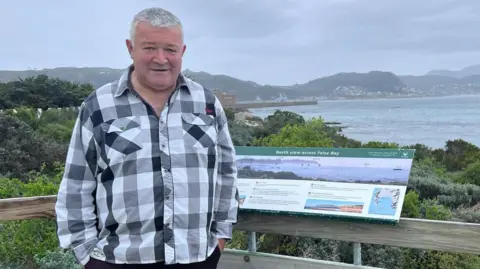 Ivor Wallace
Ivor Wallace He also said stronger government support was vital.
“We in the centre have a full-time radio station but that’s completely self-funded”, he said.
But Mr Wallace said he did not believe street signs that include Ulster-Scots were necessary.
“I can’t see how I could justify the cost of street signage in Ulster-Scots,” he said.
“Everyone speaks English so what’s the point in having dual language signs up?”
The experts urged the authorities “to depoliticise language and identity issues”.
They also criticised the UK government and the Stormont executive for failing to provide information about the protection and promotion of Irish and Ulster-Scots.
BBC News NI has contacted the Department for Communities for a response.
Related
Youth football teams hold minute’s silence for 10-year-old Poppy Atkinson
Youth football teams and grassroots clubs across the country have held a minute’s silence at the start of their games to commemorate a 10-year-old girl who di
Girl’s death sparks minute’s silence at football matches nationwide
10-year-old Poppy Atkinson was killed when she was struck by a car during a training session at Kendal Rugby Club in Cumbria. Clubs from Leeds to London
Liverpool fans’ Uefa claim can be heard in England, judge…
The high court, sitting in Liverpool, heard Uefa had relied upon the principle that English courts will not inquire into the legality of actions by foreign gove
Alan Shearer’s Premier League predictions including Manchester United vs Arsenal
Caption: Alan Shearer?s Premier League predictions credit: Getty / Metro After some impressive results for English sides in Europe the focus is













